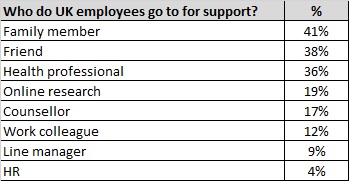Less than 10% of UK employees discuss mental health with their managers

Three-quarters (74%) of UK employees who have experienced a mental health condition have reported that stigma towards mental health in the workplace has reduced over the past year– although there is more work to be done as employees still feel unable to discuss mental health with their line managers, according to new research from Aviva.
The findings from Aviva’s upcoming Health of the Workplace report released for Time to Talk Day, revealed that just 9% of employees who have had a mental health condition sought help from their line manager. Meanwhile, 12% would discuss their mental health with a work colleague. Only 4% would talk to HR.
Employees say that they would typically speak to their family (41%) and friends (38%) if they had a mental health condition.

When conversations do take place, there’s a disconnect in line managers’ perceptions of how well they’re supporting their colleagues versus what employees say they experience.
Over three-quarters (77%) of employers have said that they’re ‘good at identifying when team members are under pressure’, yet only 37% of employees agreed with this statement, which suggests there is a gap between words and actions here.
Despite this, employees are increasingly becoming mindful of their colleagues’ mental health. Over half (55%) of employees highlighted that they worked with someone who experienced a mental health condition. Encouragingly, 76% said they were concerned about their colleagues and did their best to help. Just 5% were sceptical whether their colleague actually ‘had an issue.’
There’s also a growing recognition that employees should not hide their mental health or put on a brave face if they are struggling– as 88% of employers and 87% of employees agreed that ‘it’s OK not to feel OK.’
Dr Subashini M, Associate Medical Director, UK Health & Protection at Aviva said: “It’s good to see that 88% of employers agree that it’s ‘OK to not feel OK’ - this is a positive step in the right direction. However, there still seems to be a disconnect where employers say that they want to support mental health in the workplace, but employees don’t feel that they are receiving it. Over three-quarters (77%) of employers have said that they’re ‘good at identifying when team members are under pressure’, yet only 37% of employees agreed with this statement, so why is this message not landing?
“Our experience is that there is a difference between saying and doing things: you can follow guidelines and protocols, but this needs to be done with connection and authenticity with staff. A conversation about mental health doesn’t always mean supporting a colleague through depression and anxiety. Everyone can experience triggers and symptoms that impact their mental health. The disconnect is apparent when tasks asked of employees do not change nor does the workplace culture, despite the acknowledgement of wanting to support mental health in the workplace.
“When an employer commits to a ‘Time to Talk’ pledge, it isn’t a ‘once and done.’ Employers have a vital role to play here. Employees should feel that they can be authentic at work, feel able to speak up about their mental health, and be accepted by their line managers and colleagues.
“It is also about signposting employees to the most appropriate support as mental wellbeing is also linked to financial, physical and social wellbeing. It could mean a company offering line manager training, resilience training, access to an Employee Assistance Programme, volunteering to improve wellbeing, shared parental leave, or solutions such as private medical insurance or group protection to help employees maintain and manage their mental health.”
Dr Si Thu Win, Consultant Psychiatrist at Runnymede and Spelthorne Community Mental Health Recovery Service, supported the findings saying: “A cultural shift has already begun with prominent celebrities and public figures, at least in the UK, shining a light on mental health. I think the ‘stiff upper lip’ is turning into a smile as more people are becoming more open and able to talk about their mental health."
Authored by Aviva
About Aviva
Aviva Insurance Limited is one of the UK’s leading insurance companies, part of the Aviva group with 34 million customers Worldwide. Aviva Insurance has been in the insurance business for more than 300 years.
In UK commercial, the insurance market remains challenging for insurance brokers and customers, due to the ongoing economic conditions. Aviva Insurance are focusing on improving our processes to ensure Aviva provide commercial customers with insurance cover at an acceptable price. Insurance brokers also recognised our excellent customer service by voting us Insurance Times General Insurer of the Year in 2012, for the second year running. youTalk-insurance sharing Aviva insurance news and video.

